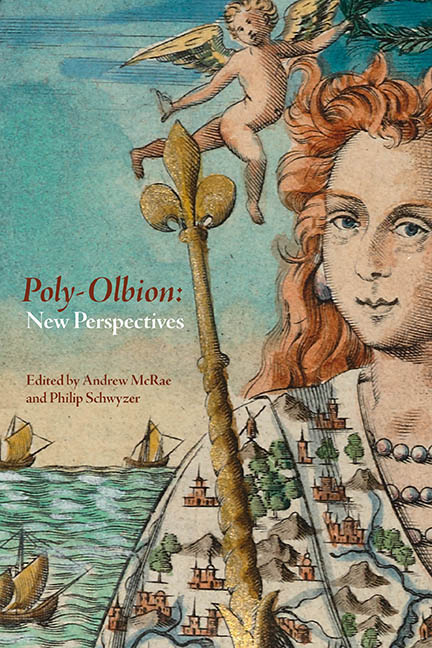7 - Maritime Olbion; or, ‘th'Oceans Island’
Published online by Cambridge University Press: 27 March 2020
Summary
Poly-Olbion is rightly known as a poem of the land, as a versified chorography that deals primarily with Britain's hills, valleys, rivers, and forests, with the histories and mythologies inscribed in them, and with the layers of civilization that the country's topography has since accrued. Notable throughout the poem is Drayton's ‘devotion to natural features of the land’, leading him to foreground the timeless, physical environment and mediate all human history through ‘topographical personifications’ such as river nymphs or speaking mountains. In a representative passage occurring early on in Song 2, the ‘Nature’ (9) or ‘varying earth’ the poet aims to approximate in the ‘varying vaine’ (8) of his pen is lightly glossed as ‘heere a hill, a vale there, there a flood, / A mead here, there a heath, and now and then a wood’ (13–14). Judged purely on its own terms as a register of Britain's key landscape features, the glaring omission in this poetic list is any reference to the sea. Given that sea coasts feature prominently on nineteen of the thirty maps illustrating the land captured poetically in the thirty songs of the poem, that choice leaves the rhetorically heightened landscape strangely unconnected to what is – historically and geologically – arguably Britain’s most important natural environment, the surrounding ocean.
This neglect of the maritime is no accidental feature of the poem but a shaping factor of Drayton's vision. Poly-Olbion is concerned primarily with the historical essence of the island nation or kingdom, whose outward geography (or hydrography) forms no constitutive part of the ‘Olbion’ celebrated in the poem. Yet the exclusion – or better, marginalization – of the maritime, I argue in this chapter, is instrumental in fostering sentiments of singularity and detachment that, however supportive of national encomium, ultimately undermine Drayton's own conviction of Britain's natural ‘greatness’. Oceans connect and facilitate contact across distance, but their relegation to the textual margins of Poly-Olbion offsets that work of connectivity, and foregoes the sea as the scene of history, trade, and cultural exchange. Instead, the poem promotes a narrative of British exceptionalism focused almost exclusively on the narrowly bounded island. A later commentator knew that such partial views only obscure wider structural links: without the sea, Marchamont Nedham noted in 1652, ‘the Land is nothing’.
- Type
- Chapter
- Information
- Poly-Olbion: New Perspectives , pp. 145 - 166Publisher: Boydell & BrewerPrint publication year: 2020

